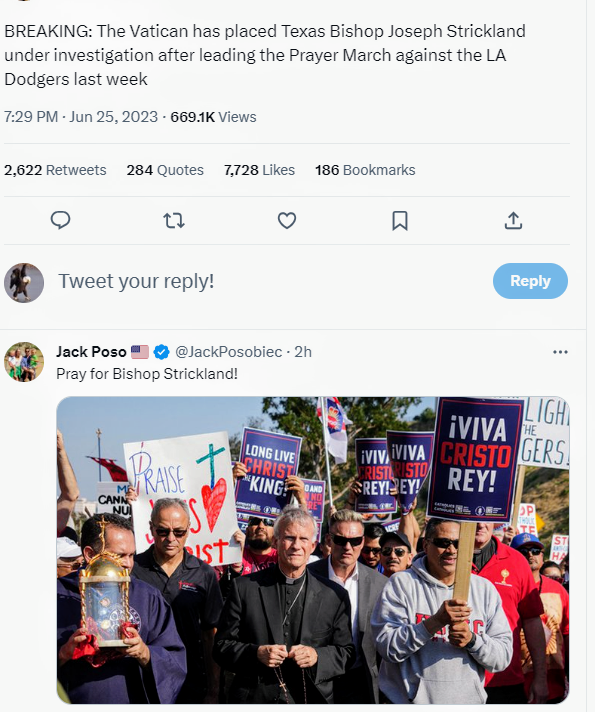
🔥⚡ THE DEVIL IS RUNNING THE 🔹 CHURCH 🔹⚡🔥 THE VATICAN PLACES BISHOP JOSEPH STRICKLAND UNDER " INVESTIGATION" -- AFTER-- LEADING THE PRAYER MARCH AT DODGER STADIUM. 🔹 THIS 🌎 IS TRULY GOING NUCKING FUTS!
(media.greatawakening.win)
🤢 These people are sick! 🤮

"The Church" went the direction of the Protestant Reformation.
https://carm.org/roman-catholicism/what-is-the-difference-between-protestantism-and-catholicism/
The devil is running any institution that has a man above the authority of God's Word.
I digress, Satan could never defeat God. His best tactic was to divide and conquer. All Christianity was under the Catholic Church up until year 1500. From one to literally over 40,000 different Protestant denominations. All of which claim to possess the truth. But they cannot all be true, all at the same time.
There is only one Church which contains the Body, Blood, Soul and Divinity of our Lord Jesus Christ; the Eucharist in the Catholic Church. We aren’t meant to be divided like we are today, which directly reflects on the great awakening Q movement. Everything happening in the political world is dividing people. We are One Body. Where we go one, we go all
whoosh
Who said Satan defeated God? False dichotomy.
As for your other claim... LOL!
No, all of Christianity was not under the Catholic Church until the year 1500. The Catholic Church was one of the major branches of Christianity and held significant influence during the medieval period, but there were other Christian denominations and groups that existed alongside it.
Prior to the year 1054, there was a split between the Catholic Church in the West and the Eastern Orthodox Church in the East, known as the Great Schism. The Eastern Orthodox Church became a separate branch of Christianity with its own traditions, practices, and leadership centered in Constantinople (now Istanbul).
In addition to the Catholic Church and the Eastern Orthodox Church, there were also various other Christian groups that emerged throughout history. Some of these groups were considered heretical by the Catholic Church and faced persecution, while others formed separate churches or denominations. Examples include the Coptic Orthodox Church, the Armenian Apostolic Church, the Ethiopian Orthodox Tewahedo Church, and various Protestant movements that emerged during the Reformation in the 16th century.
The Reformation, which began in the early 16th century, led to significant changes within Christianity. Reformers such as Martin Luther, John Calvin, and others challenged the authority and practices of the Catholic Church and established new Protestant denominations. This further diversified Christianity, leading to the coexistence of multiple Christian traditions.
Therefore, it is not accurate to say that all of Christianity was under the Catholic Church until the year 1500. There were other branches of Christianity, including the Eastern Orthodox Church, as well as various independent Christian groups and emerging Protestant movements.
Out as far as the retarded claim that there's over 40,000 Crofton denominations.... LOL another typical Catholic apologetic lie.
First off many Protestant denominations as you call them are virtually identical with minor minor differences like different types of worship music, and different views on small non-salmifications like infant baptism and integrated family worship. This is nothing compared to the chasm between Catholic and Protestant beliefs.
It is difficult to provide an exact number of Protestant denominations because there is no central authority or comprehensive list that encompasses all of them. The Protestant movement is known for its diversity and the presence of numerous denominations, each with its own practices, and organizational structures.
The World Christian Encyclopedia, which was last published in 2001, estimated that there were over 33,000 distinct denominations within global Christianity, including both Protestant and non-Protestant groups. However, it's important to note that this number includes a wide range of denominational categories and subgroups, some of which may be very small or localized.
While it is challenging to give an exact number, it is generally understood that there are several major Protestant denominations, such as Baptist, Methodist, Lutheran, Presbyterian, Anglican, Pentecostal, and many others, each with their own subgroups and variations. Guess what? They all share the same core beliefs. ....
Justification by faith alone: This is a central doctrine of Protestantism, emphasizing that individuals are justified and made right with God by faith alone, apart from any human works or efforts. It teaches that salvation is a gift of God's grace, received through faith in Jesus Christ.
Authority of Scripture: Protestants emphasize the authority and sufficiency of the Bible as the Word of God. They believe that Scripture is the primary source of divine revelation and the final authority in matters of faith and practice.
Priesthood of all believers: Protestants emphasize the priesthood of all believers, affirming that all believers have direct access to God and are called to serve as priests to intercede for others and offer spiritual sacrifices. This contrasts with the Catholic understanding of a distinct ministerial priesthood.
Substitutionary atonement: Protestants generally believe in the substitutionary atonement of Christ, which teaches that Jesus Christ died on the cross as a substitute for sinners, bearing the penalty of sin and reconciling humanity to God.
Personal relationship with Christ: Protestants emphasize the importance of a personal relationship with Jesus Christ as the means of salvation. They believe in the need for individuals to personally trust in and accept Jesus Christ as their Lord and Savior.
Baptism and the Lord's Supper: While there can be variations among denominations, most Protestants recognize the sacraments of baptism and the Lord's Supper (also known as Communion or the Eucharist) as important expressions of faith. The significance and practices related to these sacraments can differ among denominations.
Catholicism on the other hand..... Shares each other's mistakes and mandates them from the top down.